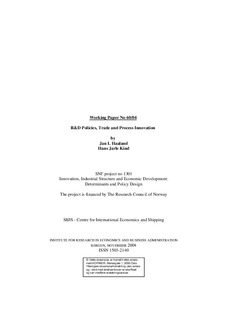| dc.contributor.author | Haaland, Jan Ingvald Meidell | |
| dc.contributor.author | Kind, Hans Jarle | |
| dc.date.accessioned | 2006-06-23T12:13:02Z | |
| dc.date.available | 2006-06-23T12:13:02Z | |
| dc.date.issued | 2004-11 | |
| dc.identifier.issn | 1503-2140 | |
| dc.identifier.uri | http://hdl.handle.net/11250/165534 | |
| dc.description.abstract | We set up a simple trade model with two countries hosting one firm each. The firms invest in cost-reducing R&D, and each government may grant R&D subsidies to the domestic firm. We show that it is optimal for a government to provide higher R&D subsidies the lower the level of trade costs, even if the firms are independent monopolies. If firms produce imperfect substitutes, policy competition may become so fierce that only one of the firms survives. International policy harmonization eliminates policy competition and ensures a symmetric outcome. However, it is shown that harmonization is not necessarily welfare maximizing. The optimal coordination policies may imply an asymmetric outcome with R&D subsidies to only one of the firms. | en |
| dc.format.extent | 579787 bytes | |
| dc.format.mimetype | application/pdf | |
| dc.language.iso | eng | en |
| dc.publisher | SNF | en |
| dc.relation.ispartofseries | Working paper | en |
| dc.relation.ispartofseries | 2004:60 | en |
| dc.subject | trade | en |
| dc.subject | R&D | en |
| dc.subject | subsidies | en |
| dc.subject | process innovation | en |
| dc.title | R&D policies, trade and process innovation | en |
| dc.type | Working paper | en |
